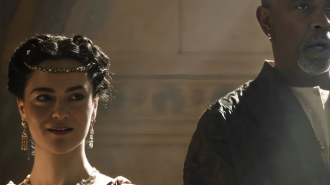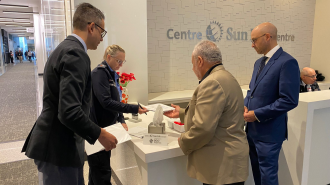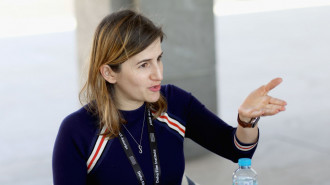
Disabilities in northwest Syria: Stories of resilience amid hardship

While wandering in a civilian market in Idlib, Syria in April 2018, Muhsen’s life changed forever when the city was attacked from the air. His left leg was too injured to save and it was amputated from directly above his knee.
“I became unable to carry out the simplest tasks at home,” the 35-year-old husband and father tells The New Arab.
Most regrettably, Muhsen could no longer ride a motorcycle, his escape and “source of relief.”
"The protracted conflict in Syria has resulted in widespread violence, including bombings, shelling, and armed confrontations, leading to a significant number of injuries, amputations, and disabilities among citizens"
“One time after my amputation, I tried to ride a motorcycle with my wife and children,” he says.
“As soon as I rode a little, I lost my balance and we fell to the ground. This was a harsh and painful incident for me,” Muhsen adds.
Even though he felt his determination to overcome the hardships of living with a disability was strong, he found the practicalities had a “profound impact on the soul.”
In northwest Syria, which has been ravaged by 13 years of conflict, it is estimated by the UN that around 37 percent of the Syrian population over the age of two suffers from a disability.
The percentage is more than double the world average, which is around 15 percent.
“The protracted conflict in Syria has resulted in widespread violence, including bombings, shelling, and armed confrontations, leading to a significant number of injuries, amputations, and disabilities among citizens,” Rajab Haj Saleem, Area Supervisor for Islamic Relief in Idlib, tells The New Arab.
Challenges faced by people with disabilities in northwest Syria
The impact of a higher-than-average number of people living with disabilities has made living with a disability unusually difficult in northwest Syria.
Although Saleem says people with disabilities receive a degree of medical care, rehabilitation services, assistive devices, vocational training, and educational and empowerment programmes from NGOs, government agencies, and international aid groups, it still is not enough.
“It is often inadequate due to factors like limited funding, infrastructure damage, security concerns, and competing humanitarian needs,” says Saleem.
From his personal experience, Muhsen says medical support for those with a disability is “not as it should be.”
“It’s impossible for it to be,” he said.
“The necessary treatment to stabilise our health conditions is not available, especially for those who suffer from the disability of having one limb amputated. We need good-quality prosthetic limbs, and there are not enough medical centres. They are often very far away so we face the problem of transportation. The quality of the available limbs is often very poor and are not capable of helping or compensating for the limb lost,” Muhsen adds.
Lack of adequate medical support and social stigma
But it isn’t just the medical support lacking. Saleem says many people with disabilities in northwest Syria face social and education obstacles.
“They often face social stigma and discrimination, leading to exclusion, marginalisation, and limited opportunities for participation in community life,” he says.
Muhsen adds, “Discrimination in the labour market, coupled with physical barriers and inaccessible workplaces, contributes to high rates of unemployment among people with disabilities. Many schools and educational institutions in Syria are not equipped to accommodate the diverse learning needs of students with disabilities, leading to segregation and exclusion from mainstream education.”
"Many individuals with disabilities demonstrate remarkable flexibility and adaptability in their daily lives. They find innovative solutions to overcome physical barriers and challenges"
Despite odds stacked against him, Muhsen made himself proficient in using office programmes.
“I was able to get a job to secure my family’s livelihood. This is something I am most proud of,” he says.
Months after his amputation, Muhsen stumbled across a sports club that hosted an amputee football team. Even though he had never had an interest in the sport, Muhsen decided to give it a go.
“When I start playing, the feeling cannot be described.
“It is an indescribable happiness. I forget myself and release my energy and all the pressures I face in life. On the field we are all in the same condition and have disabilities. You do not feel that there is anyone more special than you, and no one treats you with arrogance. Among amputee people, you do not feel that you suffer from any deficiency. You feel that you complete each other. We have a goalkeeper with an amputated hand. I get down and tie his shoes for him and I am happy, and he supports me when I stand,” he says
Saleem knows of many in northwest Syria who live with the same determination as Muhsen. Those who despite their disabilities and the lack of support for them, have resolved to live a fulfilling life.
“Many individuals with disabilities demonstrate remarkable flexibility and adaptability in their daily lives. They find innovative solutions to overcome physical barriers and challenges,” he says.
Resilience and determination: Experiences of overcoming hardships
With the help of a supportive family and strong faith, Saleem has watched as people with disabilities advocate for themselves to further their education, skill, and employment opportunities.
Shaima Hilal, a woman living in the Aleppo countryside has displayed a similar resilience as Muhsen. Born without a right femur, Shaima has used a crutch to help her walk for most of her 33 years of life.
Throughout childhood, her family and friends behaved “completely normal” with her, but she does remember a certain school trip to a famous Syrian castle, when she was made to feel different.
“The teachers gathered and said I should not walk to the castle because its stairs are dilapidated, old, and difficult to climb,” Shaima tells The New Arab.
Shaima elaborated, “They decided I should stay on the bus and wait for them to return. I stayed until they were gone, and I walked quickly in front of them and climbed the stairs before them while they were looking at me.”
Although Shaima has attempted to get a prosthetic limb, the ongoing conflict, affecting transportation and supplies, has meant there haven’t been the resources to get one that would meet her needs.
“One of the obstacles I face because I use the crutch, is how often they break.
“Sometimes I am on the street or in the workplace outside the home and suddenly the crutch breaks. I always have to be careful and have a spare crutch in the car or at home. But the crutches are not as available as they used to be. Sometimes I have to buy crutches for 20 dollars because medical centres do not always have free crutches,” she says.
"All we want is for people to treat us as human beings"
When she applied for a job six months ago, those conducting the interview were surprised when she walked in.
“We did not know about your condition,” they told Shaima.
She didn’t get the job and had no justification or apology.
Despite what she has faced, she doesn’t want the “pity” or “sadness” of people.
“All we want is for people to treat us as human beings.
“I am stubborn and have the determination to achieve everything I want. I wanted to study, so I studied, and I wanted to work, so I worked. I set a goal in mind and reach it by striving, with the help of my family and friends. I am certain that our destiny is written, and everything happens according to God’s will. Therefore, we must be patient and overcome the obstacles and challenges we face without objection,” she says.
Even though she has achieved much, many consider what she has done as “normal” and “simple.”
“But I am a 33-year-old displaced woman with a disability, and I was able to achieve all of that,” she says.
Shaima adds, “I have overcome my disability and overcome the difficulties of displacement. I have become accustomed to my reality and adapted. I worked and did not stop at any point. I did not give up on anything.”
For the thousands of people living with disabilities in northwest Syria, Muhsen, Shaima, and Saleem are calling for greater support.
“There is a need for increased funding, improved infrastructure, strengthened healthcare and education systems, expanded vocational and life skills training, and greater efforts to promote inclusion and combat discrimination,” Saleem concludes. He says greater collaboration between government agencies, NGOs, international organisations, and local communities is essential to address these needs effectively.
“We do not need a food basket or for donation campaigns to be held for us in the way of filming clips that show the suffering,” Shaima also concludes. “What we want is to be able to study, work, and to have access to better opportunities.”
Lauren Crosby Medlicott is a freelance features writer specialising in social justice issues
Follow her on Twitter: @LaurenMedlicott






 Follow the Middle East's top stories in English at The New Arab on Google News
Follow the Middle East's top stories in English at The New Arab on Google News


